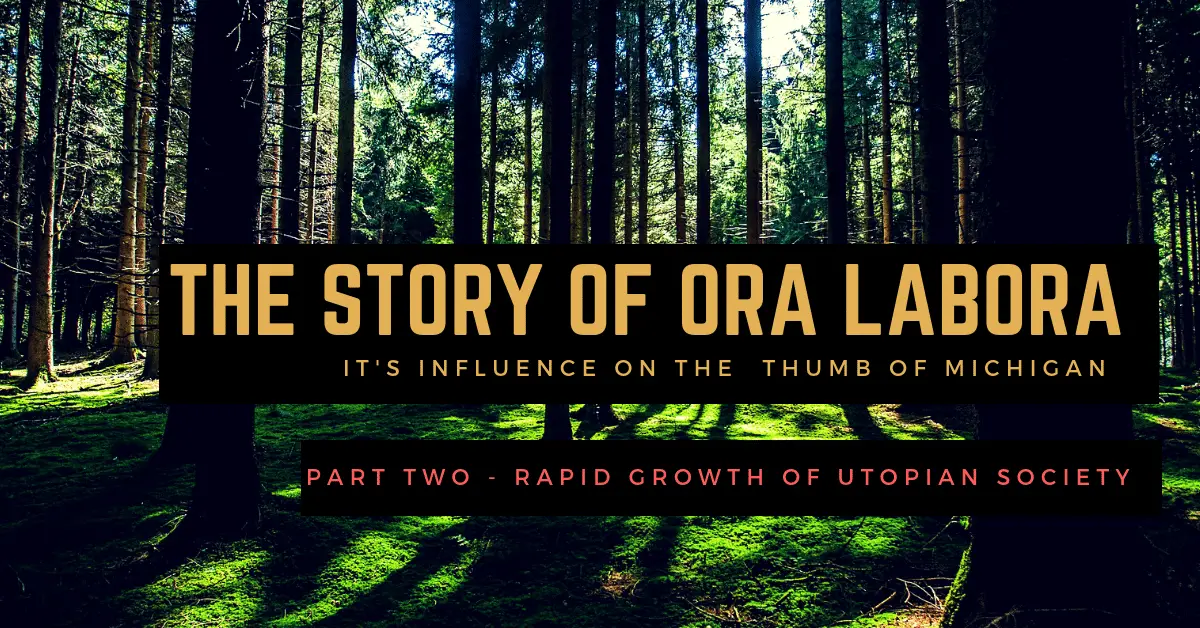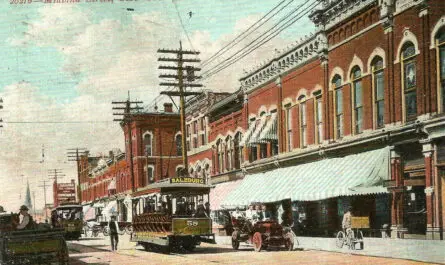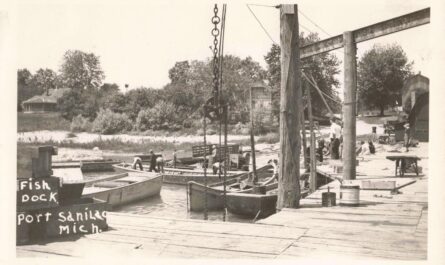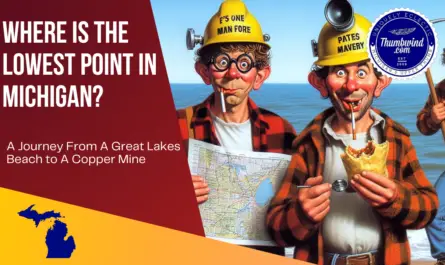Part II of the Ora Labora 1863 story outlines the summer of ’63. The building is rapid and progress exciting in Michigan’s north. But the looming effect of the Civil War is about to impact this fledgling German religious colony’s effort to bring their culture and traditions to the Great Lakes wilderness.
Utopian Society on the Shores of the Great Lakes
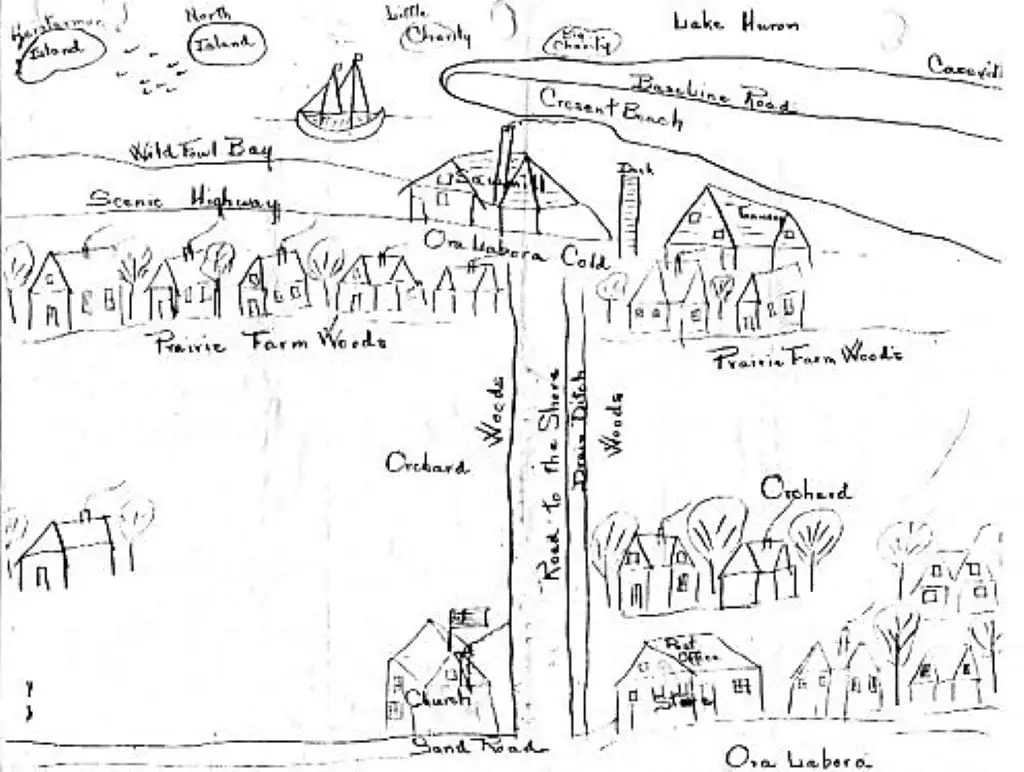
Gentle waves made their way across the bay and lapped on the sandy beach. It was hot for early May but the black flies and mosquitoes had yet to come out in force. He had been at this beach last year. Back in the fall of 1862, Emil Baur could only glance at the tree-lined shore of the 3,000 acres of land he had acquired under the homestead provisions from the state of Michigan. He was just too busy. Last fall he arranged for some men from Saginaw to come and clear a couple of acres of dense forest for he was expecting the first residents of the Ora Labora religious colony to arrive in the early spring. They had arrived and in only a few months progress was being made.
Emil Baur was the leader of this wilderness colony. It took him almost five years of convincing the German Methodist Church leadership, raising funds in Ohio, and several trips to the Michigan wilderness putting together a suitable patchwork of land to start the colony. He was now responsible for over 100 settlers on this windy eastern shore of Saginaw Bay known as Wild Fowl Bay.
Ora Labora’s Rapid Building and Government Recognition
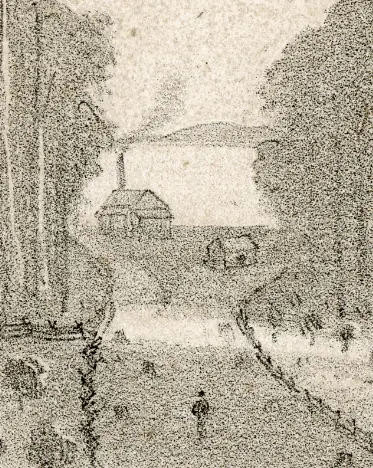
The 28 families had come, and with their arrival to Ora Labora in the early spring in 1863, it was time to create a town out of this wilderness. Emil had envisioned the new town established in a similar fashion as another successful colony called Zoar near Canal Dover Ohio. Emil had visited Zoar in 1861 and was impressed with their success. Using the thick timber available all around them, the men built several communal blockhouses to house the families. Work felling trees were easier in the without the heat and the pesky flies. The blockhouses, a gristmill, and a store were quickly built.
The Ora Labora settlement sat in the middle of the stagecoach route from Saginaw to Port Austin, Emil petitioned the Postal Service to grant the colony its own post office. To his surprise, it was granted and in February the Post Office German Colony, Ora Labora, Huron Co., Mich. received, its first mail from the outside world. The new Post Office is a huge step and a positive development for the community for it meant that they were literally “on the map” and reachable by the world for the cost of a stamp. Time and money where both commodities that were in short supply. Now with a post office, he could quest for new residents, new trading partners, and most importantly more money.
Ora Labora in 1863 Had to Live Off the Land
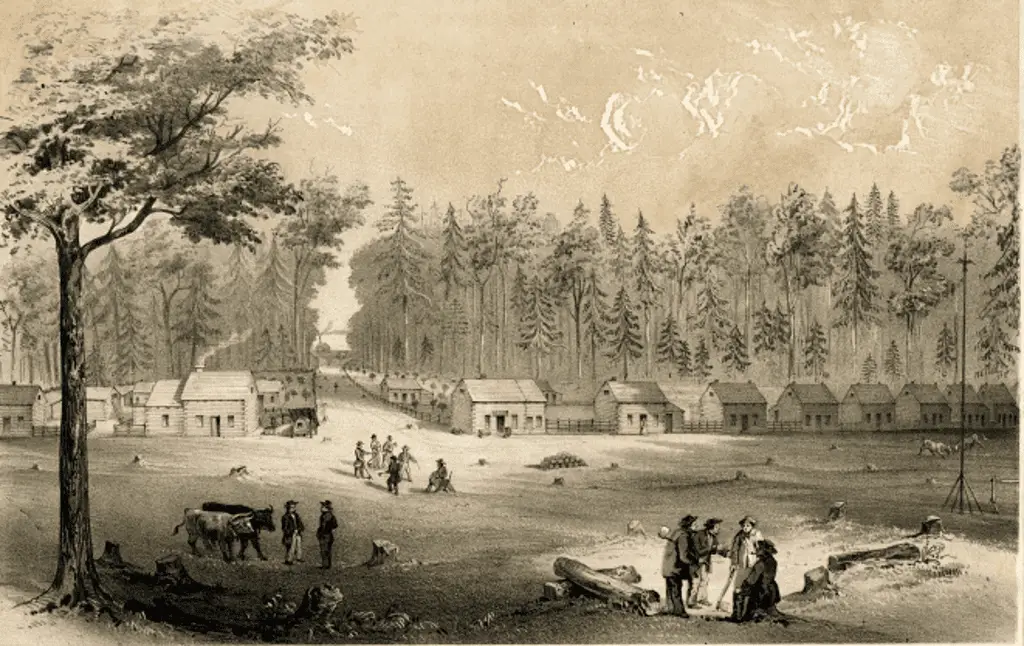
The colony’s leaders had hoped to start planting crops the first year; however, with only a few acres cleared it became quickly clear that they might be more profitable clearing timber for posts and rough-cut boards. The colony’s leadership divided their group into three working groups; business, agricultural and fishing. With tall cedar, bordering the shore as far as the eye can see they quickly settled on the manufacture of telegraph poles. This would serve a couple of goals: clear the land for future farming, and provide a product to sell for immediate cash.
They were in the process of constructing a 1500 foot dock out into the shallow bay as Emil returned from Ohio. He was skeptical of the dock. He saw firsthand the crushing power of Great Lake ice in the closing days of winter. He was sure the effort would not last however, there was little choice. Ships could not get close enough to shore in the shallow bay to load the hundreds of 25-foot telegraph poles they expected to sell. The dock also served to enable the fishing parties to secure their boats. Fish was so plentiful in the bay that they started selling fish at 2 cents a pound.
German Culture and Traditions in the North Michigan Woods
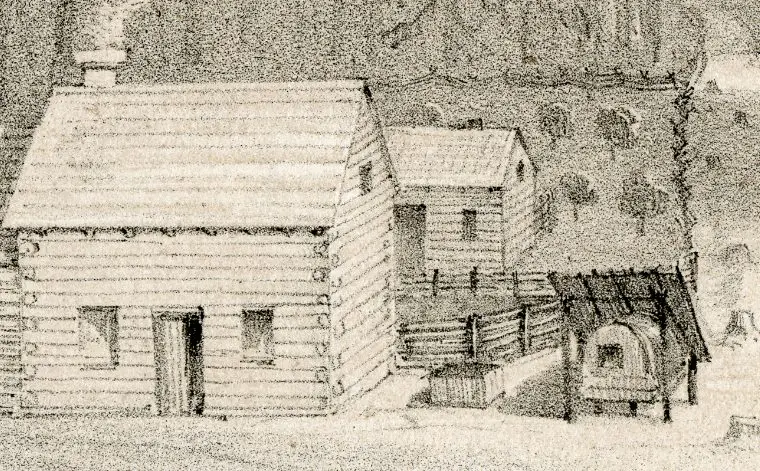
The flour mill was one of the first buildings constructed after the houses. The horse-drawn gristmill allowed Ora’s residents the ability to grind their supplies of barley and wheat into fine flour for baking and coarse grinds to make malt for brewing beer. The milling and baking operation was essential to keeping part of their German culture alive in the wilderness. The bread was baked in a large community oven near the store in the center of town. To the colonists, the importance of the community oven was part of German village life. In Germany, the bakehouse could be a place for women to socialize and exchange news and the children to get together and play. Each day families prepared their dough and brought them to the stone oven at their assigned time. Pans of dough were marked with distinctive cuts or with metal “tallies” for each family.
The baker in charge tended the fire under the oven until there was a constant level of burning coals and heat. Once up to temperature, the baker would place the dough on a long smooth plank that slid on grooves in the sides of the oven. The plank would be slid into place above the coals. It was the perfect distance to be safe from burning, but close enough to absorb the heat, which reflected back from the stone ceiling. The scent of baking bread must have been an ongoing and daily treat in the center of town. The mothers would send the children to claim their delicious loaves as they were drawn out of the oven. Each child would bring a clean towel or sackcloth. This was used to wrap the golden brown crusty bread for the short walk home.
Ora Labora Unaware of the Looming Crisis of Civil War
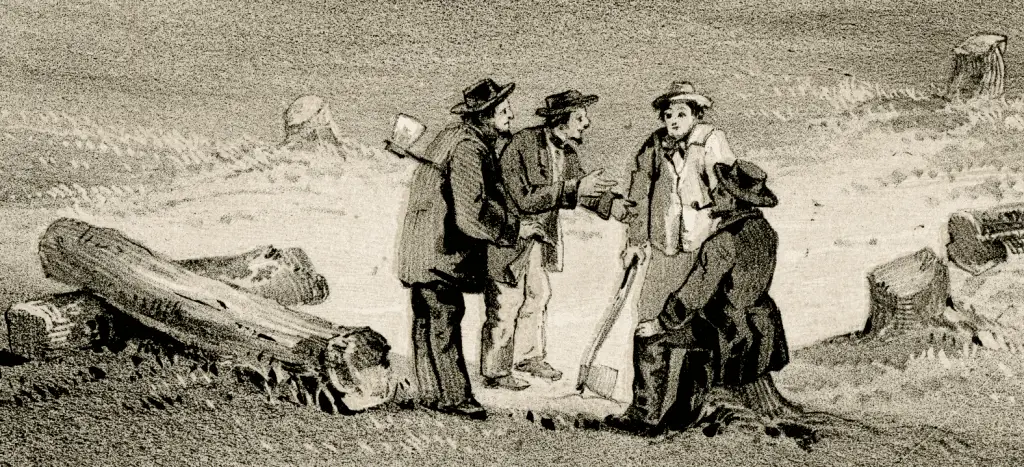
Emil was admiring all that the colonists had accomplished in such a short time. The community had comfortable homes, and the basic needs were being met. Soon efforts would turn to build a true church and a school. Still, he was in short supply of men with frontier experience and backwoods skills. He needed men who could hunt and trap. The Business group was still trading with the Indians for a majority of the community’s meat and fish. Without more families that had outdoor and farming skills, Ora Labora would struggle to exist. The colony earned cash by making telegraph poles and rough cut lumber. He needed more people and he needed more cash.
However, unknown to Emil and the rest of the Ora Labora 1863 community, there was a more ominous and unavoidable threat ahead. The war with the rebellious southern states was going on two years. Calls by the Union Army to the state governors for more men were not even close to meeting the over 600,000 men needed to hold the advancing Confederates let alone win the war. In early March, the Huron County News reported that the Conscription Act had passed the Senate and was on its way to becoming law. Emil did not know it yet but the American Civil War was about to impact the German colony in ways he never envisioned.
Related Stories About the Upper Thumb’s Ora Labora
- Ora Labora – A Lost Colony In Michigan’s North – Ora Labora known as “Christian German Agricultural and Benevolent Society of Ora et Labora” (Pray and Work), where it’s parishioners could combine work with prayer, and live according to the Methodist Church Discipline. Founded in 1862.
- Ora Labora – A Lost Colony in Michigan’s North – Part Three – Part III of the Ora Labora story brings us to 1864. The rapid growth of the colony was costly and the society needs funds to grow. It was time for drastic measures. The raging war in the south was turning in the North’s favor.
- Ora Labora – A Lost Colony in Michigan’s North – Part Four – Part IV of the Ora Labora start during Christmas 1864. The Colonies funds and provisions are low and its leader Emil Baur is begging his benefactors for loans to make it through the winter. With the war in its closing days, the colonist is hopeful.
Sources Consulted for Ora Labora 1863
- Ora Labora: Experiment in Communal Living, Caseville Historical Museum, Unpublished.
- Translated Letters of Ora Labora from Dr. Robert Conway. Private Collection.
- Ora Labora — A German Methodist Colony. Parts I & II, May 1982, Adrian College
- Nixon, “The Society of Separatists of Zoar,” Dissertation., p.162.
- Ohio History Journal – The Ohio Historical Quarterly p 136

